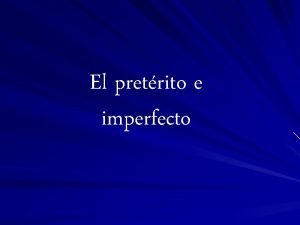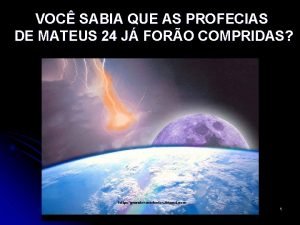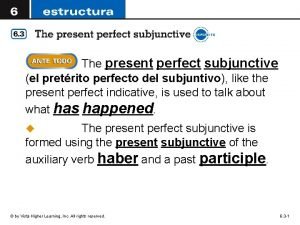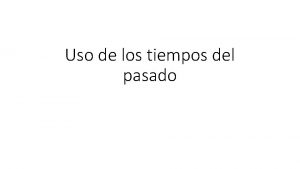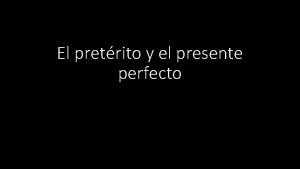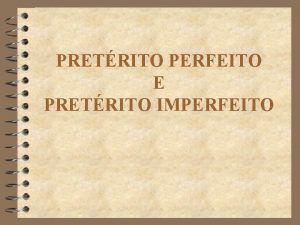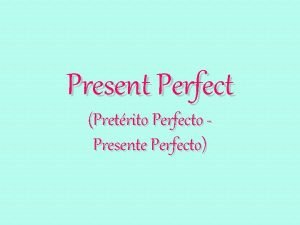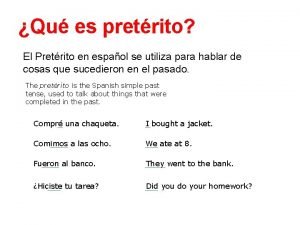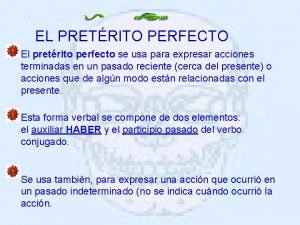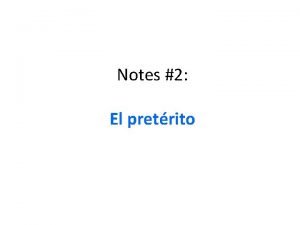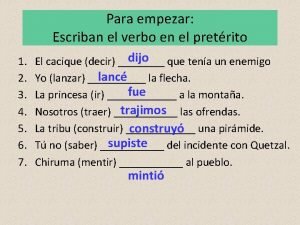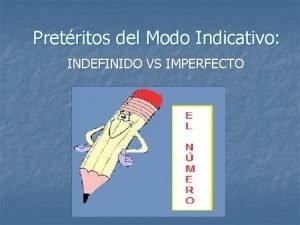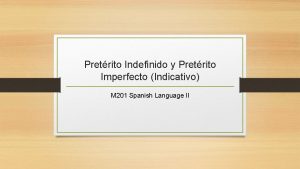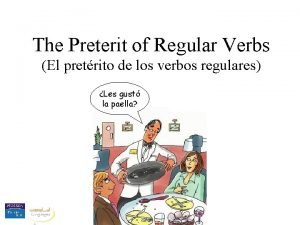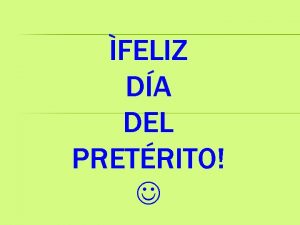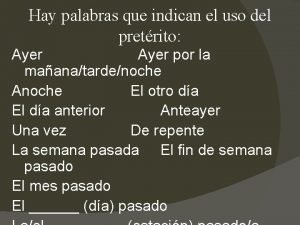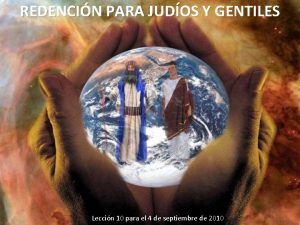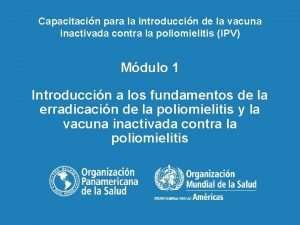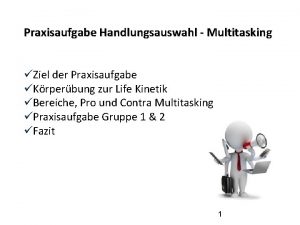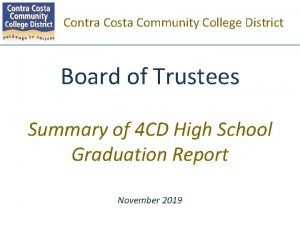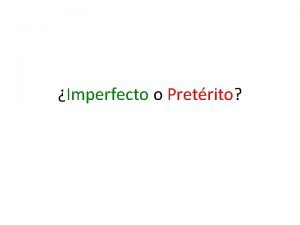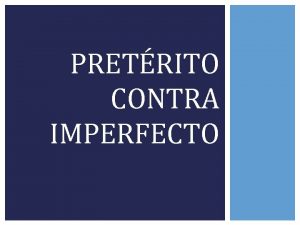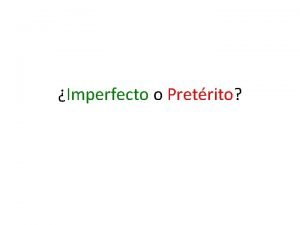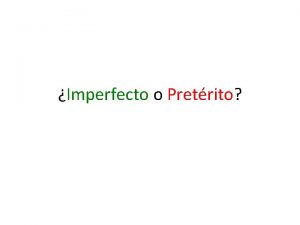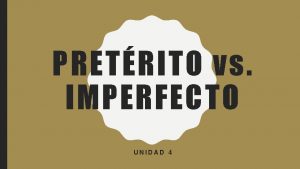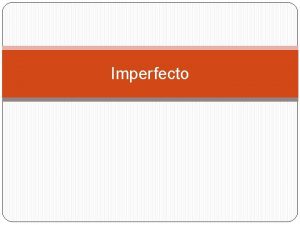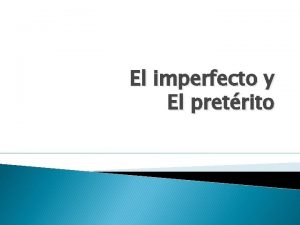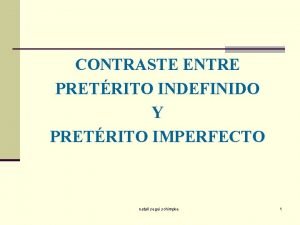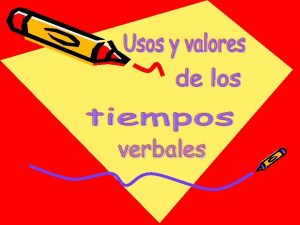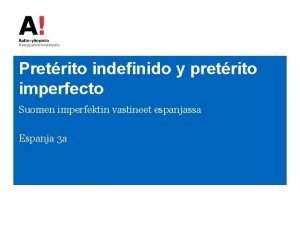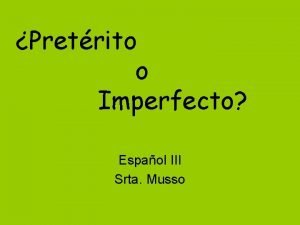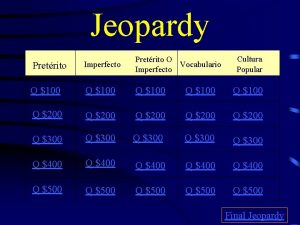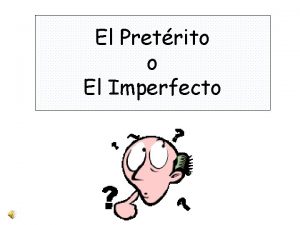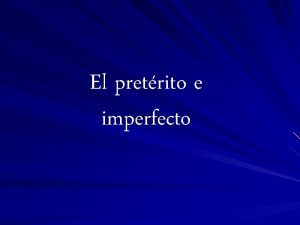PRETRITO CONTRA IMPERFECTO EL PRETRITO Y EL IMPERFECTO






















- Slides: 22

PRETÉRITO CONTRA IMPERFECTO

EL PRETÉRITO Y EL IMPERFECTO �If we are talking about the past, how can we decide which past tense to use? PRETERITE -one time action -completed event �This Venn Diagram sets up the basics… IMPERFECT P A S T -ongoing actions -events that used to happen

EL PRETÉRITO � B—beginning or end of an action � O—one time � L—lightning fast! � T—transitions/series of completed events

BEGINNING OR END OF AN ACTION � Ejemplos ▪empezar/comenzar: ▪ El hombre empezó a llorar. (The man began to cry. ) ▪ Yo empecé a comer. (I started to eat. ) ▪terminar: ▪ Los estudiantes terminaron las pruebas. (The students finished the quizzes. )

ONE TIME ACTION/EVENT � Ejemplos ▪Yo fui a la tienda la semana pasada. (I went to the store last week. ) ▪Nosotros vimos la película anoche. (We saw the movie last night. )

LIGHTNING FAST! (SUDDENLY) �Ejemplos *interruption ▪Yo estudiaba cuando llegó mi amigo. (I was studying when my friend arrived. ) ▪De repente, ¡el enemigo apareció a la puerta! (Suddenly, the enemy appeared at the door!)

TRANSITIONS (FIRST, THEN) � Ejemplos ▪Primero me desperté y entonces me duché. (First I woke up and then I showered. ) ▪Luego, el príncipe y la princesa fueron al palacio. (Later, the prince and princess went to the palace.

SERIES OF EVENTS � Ejemplos ▪Sara cenó, hizo la tarea y se acostó. (Sara ate dinner, did her homework and went to bed. ) ▪Fuimos de compras, compramos la ropa y regresamos a casa. (We went shopping the day, bought clothes and went home. )

PALABRAS Y FRASES IMPORTANTES (Trigger words) �anoche �ayer �anteayer �un día �la semana pasada �el mes pasado �el año pasado �el lunes pasado �el fin de semana pasado

Más palabras: (Trigger Words) �luego �después �entonces �de repente �inmediatamente suddenly immediately

EL IMPERFECTO � U—“used to” � B—background info. /description � O—ongoing actions � A—age � T—tiempo (time , weather and day)

USED TO DO SOMETHING � Ejemplos ▪Yo siempre jugaba al fútbol cuando era niño. (I would always play/I always played soccer when I was a kid. ) ▪Mi hermano iba a la escuela primaria de Ballantyne. (My brother used to go to Ballantyne Elementary. )

BACKGROUND INFO � Ejemplos ▪El príncipe era muy valiente. The prince was very brave. ▪Había mucha gente allí. There were a lot of people there. *había = there was/there were (imperfect of “hay”; from “haber”)

ONGOING ACTIONS Ejemplos ● Ella estudiaba mientras yo dormía una siesta. She was studying while I was taking a nap. ● Ella estaba estudiando mientras yo estaba durmiendo una siesta. was/were + ing is always imperfect �Nosotros jugábamos fútbol cuando empezó a llover. We were playing soccer when it started to rain.

AGE (LA EDAD) � Ejemplos ▪ Remember we use the verb TENER to talk about age! ▪Yo era muy bajo cuando tenía 4 años. I was really short when I was four.

TIEMPO (TIME, DAY, WEATHER) ▪Ejemplos ▪Eran las dos cuando llegamos. It was 2: 00 when we arrived. ▪Hacía frío y llovía. It was cold and raining.

Palabras Importantes Para el Imperfecto (Trigger words) �siempre �nunca cuando �Usualmente �normalmente �cada (año, verano) �todos los días �mientras �los lunes �generalmente/por lo general �con frecuencia a veces de vez en

VERB ENDINGS: REGULAR PRETERITE -AR -ER/-IR

VERB ENDINGS: REGULAR IMPERFECT -AR -ER/-IR

PRÁCTICA: PARTE 1 Choose whether the following statements would be considered preterite or imperfect in Spanish: 1. I went to the store last night. 2. She used to play with dolls. 3. They would always eat early. 4. We cooked dinner at 5: 00. 5. You made cookies yesterday. 6. When I was 5, I ate cookies every day.

Práctica Escoge el verbo correcto que completa la oración. 1. De niña, la princesa (era/fue) muy juguetona. 2. De repente, el caballero (entraba/entró) al castillo. 3. En aquel momento, la hada madrina (transformaba/transformó) la ropa sucia a un vestido elegante. 4. Mientras el caballero (buscaba/buscó) la princesa, la malvada (se cambiaba/se cambió) a una mujer bonita. 5. (Hacía/hizo) mal tiempo cuando el dragón (aparecía/apareció).

PRÁCTICA: 1. Yo ________ (ir) a la tienda anoche. 2. Ella ________ (jugar) con las muñecas cuando era niña. 3. Ellos siempre ________ (comer) temprano. 4. Nosotros ________ (preparar) la cena a las cinco. 5. Mi abuela ________ (hacer) galletas ayer. 6. Cuando yo _________ (tener) diez años, ________ (empezar) a tocar el violín.
 Pretrito imperfecto
Pretrito imperfecto Nação contra nação reino contra reino
Nação contra nação reino contra reino Pretrito perfecto
Pretrito perfecto Pretrito
Pretrito Mudarse future tense
Mudarse future tense Pretrito
Pretrito Pretérito indefinido
Pretérito indefinido Presente perfect continuous
Presente perfect continuous Presente imperfecto
Presente imperfecto Perfecto irregulares
Perfecto irregulares Fuji verbs spanish
Fuji verbs spanish Empezar indefinido
Empezar indefinido Indefinido terminaciones
Indefinido terminaciones Pretrito
Pretrito Pretrito
Pretrito Past tense spanish
Past tense spanish Verbos locos preterite
Verbos locos preterite Pretrito
Pretrito Al que pecare contra mi a este raere yo de mi libro
Al que pecare contra mi a este raere yo de mi libro No avives giles que se te vuelven en contra
No avives giles que se te vuelven en contra Vacuna contra la poliomielitis
Vacuna contra la poliomielitis Multitasking pro und contra
Multitasking pro und contra Contra costa college concurrent enrollment
Contra costa college concurrent enrollment
